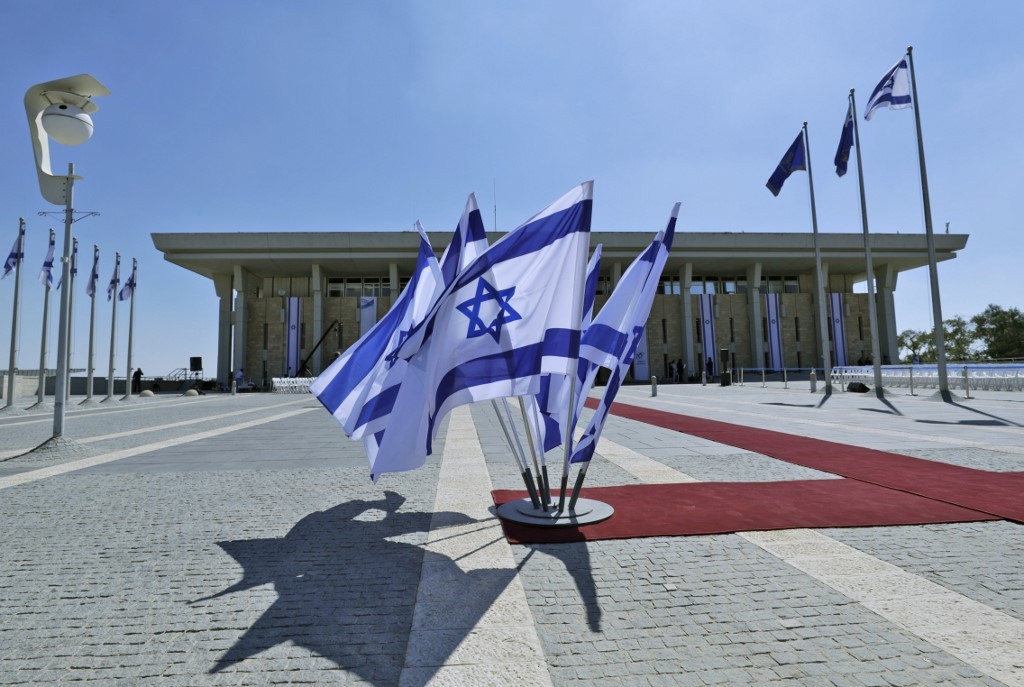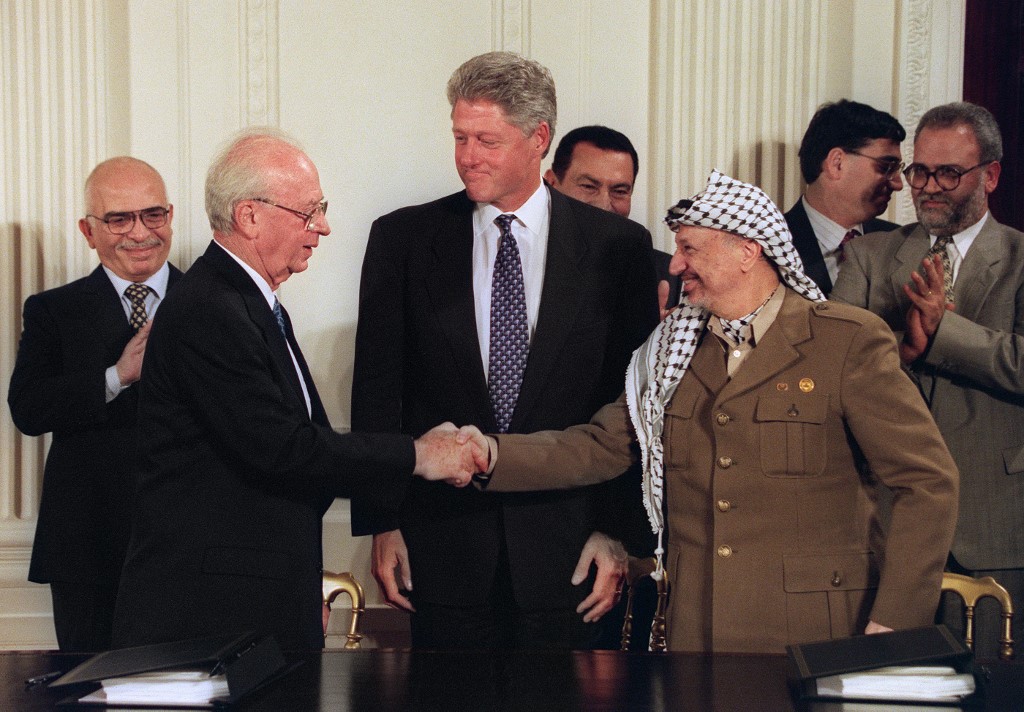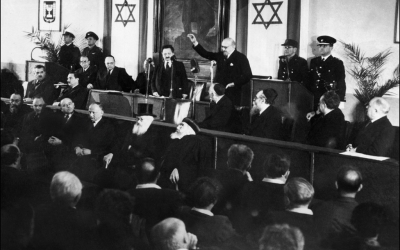Jewish supremacy and peace on Israel's terms: J Street and AIPAC have the same goals

Israel wants two things only: the right to be a racist, Jewish supremacist state, and to have peace with all Arab countries and the Palestinian people, whose lands it stole and whose rights it reserves exclusively for Jews, whether Israeli or foreign.
This has been Israel’s refrain and its official propaganda since its establishment in 1948. Seven decades on, all sectors of Israeli Jewish society and most US Jewish organisations that support Israel still insist they want the same two things, which have so far proved elusive: Jewish supremacy in Israel and peace with Palestinians and other Arabs.
Opposing BDS
Last week, the US lobbying group J Street, which defines itself as “the political home and voice for pro-Israel, pro-peace Americans”, held its annual national conference. Former Israeli Prime Minister Ehud Barak spoke at the event, as did a panoply of US politicians, including Democratic presidential candidates Pete Buttigieg and Bernie Sanders (who never tires of reminding us that he is "100 percent pro-Israel"), Palestinian negotiator Saeb Erekat and Palestinian Knesset member Ayman Odeh, among others.
All pro-Israel US Jewish organisations, including AIPAC, have always defined themselves as pro-Israel and pro-peace
J Street supports a two-state solution and opposes the Palestinian boycott, divestment and sanctions (BDS) movement. Yet, the group also states that its raison d’etre is that “the views of the majority of American Jews were previously underrepresented and ignored in our politics. We’re changing that, and in the process transforming our national conversation about what it means to be pro-Israel.”
New MEE newsletter: Jerusalem Dispatch
Sign up to get the latest insights and analysis on Israel-Palestine, alongside Turkey Unpacked and other MEE newsletters
But does this claim have any merit in view of the history of Israeli and US "pro-Israel" organisations, and the history of US administrations and Israel’s successive governments? All have also professed “pro-Israel” and "pro-peace" positions. Perhaps some history can shed light on this claim.
In 1977, after a few years of US persuasion, Egyptian president Anwar Sadat agreed to recognise Israel’s right to be a Jewish supremacist state. He sought a peace agreement with Israel to reestablish Egyptian police control, but not state and military sovereignty, over the Sinai Peninsula at the expense of sacrificing Palestinian rights on the altar of Israeli Jewish supremacy.
In March 1978, a group of Israeli reserve officers and soldiers published an open letter to Israel's prime minister, “calling upon the government to make sure this opportunity for peace was not lost”. This would be the founding gesture of what came to be known as Israel’s premier “peace” movement, Peace Now - a parsimonious rendering of its actual political agenda, namely: “Peace With Israeli Jewish Supremacy Now!”
Resolution 242 and Oslo
Peace Now supports the establishment of a Palestinian state in the West Bank and Gaza. In 1988, “upon PLO acceptance of [United Nations Security Council] Resolution 242 and the principle of the two-state solution, Peace Now led a massive demonstration of 100,000 calling on the government to negotiate with the PLO”.
Note that Resolution 242 calls for the recognition of Israel as a Jewish supremacist state through the “acknowledgment of the sovereignty, territorial integrity and political independence of every State in the area and their right to live in peace within secure and recognized boundaries”.
Peace Now also “fully supported the breakthrough represented by the 1993 Oslo Accords” whereby the “PLO renounced violence and publicly accepted Israel’s right to exist”. This shows that Peace Now’s commitment to "Israel’s right to exist", which effectively means its support for safeguarding Israel's Jewish "character" and the laws that safeguard it, has never wavered, its calls for the end of the occupation of the West Bank and Gaza notwithstanding.
Peace Now insists that Israel’s institutionalised and legal Jewish supremacy is nothing of the sort, rather that “Israel was established as a Jewish and democratic state, based on the principle that citizens should not be discriminated against due to religion, race, gender, or any other reason. Peace Now supports the establishment of a Palestinian state as a means of strengthening Israel’s Jewish and democratic values.”
Novel positions?
Peace Now’s views have inspired many a “peace” movement in Israel and the US, including the most prominent one in the 1980s: New Jewish Agenda (1980-1992), a pro-Israel and pro-peace organisation that also criticised Israeli invasions and occupations, but not the Jewish supremacist nature of the Israeli state.
On the US scene, New Jewish Agenda presented itself as a counterpoint to the formidable pro-Israel lobby, AIPAC, and its affiliates, which also support Israel’s right to be a Jewish supremacist state while calling for “peace” and an end to the “conflict” on Israel’s terms.
Then, in 2007, a newcomer to American Jewish politics on Israel/Palestine emerged on the Washington scene: J Street.
The new lobby group has pretended to offer novel positions on peace and Israel - yet this is complete amnesia, if not outright fabrication. All pro-Israel US Jewish organisations, including AIPAC, have always defined themselves as pro-Israel and pro-peace.
As part of its mission statement, AIPAC “urges all members of Congress to support Israel through foreign aid, government partnerships, joint anti-terrorism efforts and the promotion of a negotiated two-state solution - a Jewish state of Israel and a demilitarized Palestinian state”.
Certainly, none has ever claimed to be anti-Israel or pro-war. Like Peace Now, New Jewish Agenda, AIPAC, and all current and previous Israeli and US governments, J Street, which is depicted as a progressive alternative to AIPAC, is “committed to and support[s] the people and the state of Israel”.
J Street also opposes the global BDS movement, which aims to end the occupation and Israeli Jewish supremacy and facilitate the return of Palestinian refugees, as two of the BDS's three commitments contradict J-Street's commitment to Jewish supremacy in Israel.
J Street’s president, Jeremy Ben Ami, stated in the context of opposing Israel’s 2018 nation-state law - just the latest of Israel’s racist laws - that the “strong connection between Israel and Jews worldwide is based on these values that Israel is both a Jewish and democratic state”.
Lest we think J Street is unfamiliar with movements such as Peace Now, which have professed these same positions since 1978, J Street’s recent national conference was co-sponsored by, among others, Americans for Peace Now.
The case of South Africa
Now, imagine the situation in another context - that of apartheid South Africa and its long, illegal occupation of neighbouring Namibia, which lasted for decades until Namibia gained independence in 1990. South Africa extended its apartheid system, which it instituted in South Africa in 1948, to Namibia to separate the white settlers from the native Namibians.
Imagine an anti-occupation, US-based white 'progressive' group that opposes South Africa's occupation of Namibia, but is committed to South Africa's right to be a white apartheid state
Now, imagine a South African Peace Now group calling for peace with South Africa’s African neighbours and black South Africans, and even for the end of the South African occupation of Namibia, while simultaneously supporting South Africa’s right to be a white apartheid state.
Better yet, imagine an anti-occupation, US-based white “progressive” group that opposes South Africa’s occupation of Namibia, but is committed to South Africa’s right to be a white apartheid state, and you will get a better understanding of J Street’s politics.
The question that begs itself insistently is whether J Street is really a “liberal” lobbying alternative to the more “conservative” AIPAC in Washington, or whether it is yet another “pro-Israel and pro-peace” lobbying group that supports Jewish supremacy and coercing Palestinians into recognising Israel’s right to be racist under the rubric of “peace”.
J Street would like you to believe it is the former, but all the political positions it professes show that it is the latter.
The views expressed in this article belong to the author and do not necessarily reflect the editorial policy of Middle East Eye.
Middle East Eye delivers independent and unrivalled coverage and analysis of the Middle East, North Africa and beyond. To learn more about republishing this content and the associated fees, please fill out this form. More about MEE can be found here.







